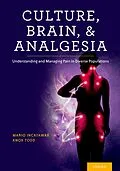In this book, the authors have placed culture in the forefront of their approach to study pain in an integrative manner. Culture should not be considered solely for knowing more about patients' values, beliefs, and practices. It should be studied with the purpose of unveiling its effects upon biological systems and the pain neuromatrix. The book discusses how a multidisciplinary and integrative approach to pain and analgesia should be considered. Some familiarity with the cultural background of patients and awareness of the provider's own cultural characteristics will allow the pain practitioner to better understand patients' values, attitudes and preferences. Knowledge of patients' cultural practices will allow determining the impact of culture on biological processes, including the origin and development of pain-related disease, and the patients' response to pharmacological and non-pharmacological treatments. Acknowledging the interactions of molecules, genes and culture could yield a more appropriate and effective personalized pain medicine. Furthermore, this approach has the potential to transform the way pain medicine is taught to young students and future pain professionals, and in so doing meet the need of trained clinicians who are versed in multiple disciplines and are able to use an integrative approach to diagnose and treat pain. A personalized medicine will have non-negligible positive effects in improving doctor patient relationships, patient satisfaction, adherence to treatment plans, and health outcomes and inequities. It is hoped that the material in this volume will appeal to a broad cross-section of health practitioners, students and academicians, including pain medicine specialists, psychiatrists, psychologists, social workers, mental health, community and public health workers, health policy makers, and health administrators.
Autorentext
Professor Mario Incayawar is a Quichua physician-scientist and educator interested in social neuroscience of pain and analgesia and cultural psychiatry. He is the recipient of the prestigious John Simon Guggenheim Fellowship 2006. He has published extensively in English, French and Spanish. Dr. Todd received his medical degree from the University of Texas Southwestern Medical Center and his MPH in Epidemiology from the UCLA School of Public Health. He began his academic career at Emory University in Atlanta and subsequently moved to New York where he joined the faculty of the Albert Einstein College of Medicine and established the Pain and Emergency Medicine Institute at Beth Israel Medical Center in Manhattan. In 2011, he became the founding Chair of the Department of Emergency Medicine at The University of Texas MD Anderson Cancer Center.
Inhalt
FOREWORD Armando Favazza PREFACE Mario Incayawar and Knox H. Todd CONTRIBUTORS 1 RELEVANCE OF PAIN AND ANALGESIA IN MULTICULTURAL SOCIETIES Knox H. Todd and Mario Incayawar Cultural Modulation of Pain Experiences 2 A LINGUISTIC APPROACH FOR UNDERSTANDING PAIN IN THE MEDICAL ENCOUNTER Lise Bouchard 3 CULTURE, PLACEBO AND ANALGESIA: CLINICAL AND ETHICAL CONSIDERATIONS Antonella Pollo, Elisa Carlino and Fabrizio Benedetti 4 PAIN IN CHILDREN ACROSS CULTURES Huda Abu-Saad Huijer 5 PAIN IN INDIAN CULTURE: CONCEPTUAL AND CLINICAL PERSPECTIVES Judy F. Pugh 6 INSIGHTS ON THE PAIN EXPERIENCE IN MEXICAN AMERICANS Evelyn Ruiz Calvillo 7 WE FEEL PAIN TOO: ASSERTING THE PAIN EXPERIENCE OF THE QUICHUA PEOPLE Mario Incayawar and Sioui Maldonado-Bouchard 8 ALLYING WITH CHINESE PARENTS FOR ENHANCED CONTROL OF PEDIATRIC POSTOPERATIVE PAIN He Hong-Gu and Katri Vehvilainen-Julkunen 9 UNDERSTANDING ANGLO-AMERICANS' CULTURE, PAIN AND SUFFERING Susan Sharp and Cheryl Koopman Culture and Pain Assessment 10 CROSS-CULTURAL USE AND VALIDITY OF PAIN SCALES AND QUESTIONNAIRES - NORWEGIAN CASE STUDY Hesook Suzie Kim, Donna Schwartz-Barcott and Inger Magrethe Holter 11 THE CLINICAL ENCOUNTER: IMPLICATIONS FOR PAIN MANAGEMENT DISPARITIES Raymond Tait 12 SOCIAL CONTEXTS OF PAIN: PATIENTS, DENTISTS AND ETHNICITY Rod Moore Disparities and Inequities in Pain Management 13 IMPLICIT AND EXPLICIT RACIAL AND ETHNIC BIAS AMONG PHYSICIANS Fatima Rodriguez and Alexander R. Green 14 ETHNIC DISPARITIES IN EMERGENCY DEPARTMENT PAIN MANAGEMENT Knox H. Todd and Mark J. Pletcher 15 PATIENT-PROVIDER ETHNIC CONCORDANCE IN PAIN CONTROL: NEGOTIATING THE INTANGIBLE BARRIER Salimah H. Meghani and Oren K. Isacoff 16 THE EFFECT OF ETHNICITY ON PRESCRIPTIONS FOR PATIENT-CONTROLLED ANALGESIA FOR POST-OPERATIVE PAIN Bernardo Ng 17 DISPARITIES IN HEALTH CARE AND PAIN MANAGEMENT FOR AMERICANS WITH SICKLE CELL DISEASE Joseph Telfair and Lori Crosby 18 UNAVAILABILITY OF PAIN MEDICINES IN MINORITY NEIGBORHOODS AND DEVELOPING COUNTRIES Laura P. Gelfman and R. Sean Morrison Cross-Cultural Management of Pain 19 DISPARITIES IN TREATMENT OF CANCER PAIN IN ETHNIC MINORITY PATIENTS Karen O. Anderson 20 THE PAIN OF CHILDBIRTH: MANAGEMENT AMONG CULTURALLY DIVERSE WOMEN Lynn Clark Callister 21 GENDER AND ETHNIC DIFFERENCES IN RESPONSES TO PAIN AND ITS TREATMENT Burel R. Goodin, Kimberly Sibille and Roger B. Fillingim 22 PAIN MANAGEMENT AMONG CHINESE CANCER PATIENTS Lara Dhingra, Graciete Lo, Victor Chang and John Tsoi 23 PAIN AND AGING: MANAGING PAIN IN AN ETHNICALLY DIVERSE POPULATION Cielito Reyes-Gibby and Guadalupe R. Palos 24 OLDER AFRICAN-AMERICANS: MANAGING PAIN AMONG THE UNDERSERVED AND MOST VULNERABLE POPULATIONS Carmen R. Green and Mythili Prabhu Pharmacogenomics and Analgesic Drugs 25 INSENSITIVITY TO PAIN: LESSONS FROM RECENT GENETICS ADVANCES Nancy Merner , Patrick A. Dion, Anna Szuto and Guy A. Rouleau 26 OPIOID REQUIREMENTS AND RESPONSES IN ASIANS Anna Lee, Simon KC Chan and Tony Gin 27 ETHNICITY AND PSYCHOPHARMACOTHERAPY IN PAIN Keh-Ming Lin Contextual Issues in Pain Medicine 28 INTEGRATIVE MEDICINE APPROACH TO CHRONIC PAIN Stephen Dahmer, Raymond Teets, and Emilie Scott 29 PHYSICIANS' PERCEPTION OF PAIN AS RELATED TO EMPATHY, SYMPATHY AND THE MIRROR-NEURON SYSTEM Mohammadreza Hojat and Mitchell J.M. Cohen 30 PAIN, CULTURE AND PATHWAYS TO CARE Gurvinder Kalra, Susham Gupta and Dinesh Bhugra The Future of Analgesia in Diverse Populations 31 CULTURE, PHARMACOGENOMICS AND PERSONALIZED ANALGESIA Mario Incayawar and Knox H. Todd
